(Originally posted on LiveJournal)
A screenwriting columnist for the Village Voice has written a rant about a graceless wannabe writer who consumed a chunk of time for the columnist.

Remember, it is the Village Voice so the language is not filtered. But I’m posting this link because there are some discussions going on about it in two widely divergent communities I belong to.
One of those communities is a comic book message board. A couple of posters registered only the ranting in the column, and so immediately labeled the columnist a jerk. There was a lot of “I’ll bet when he was coming up through the ranks, he asked some pro he admired to read his stuff!” Underneath that was the implication that the columnist was an insenstive brute who climbed the ladder of success by troding on the backs of those “ahead” of him. They felt he was being insenstive to the wannabe.
Which only makes me wonder if they actually read the column all the way through.
The other community where it is getting some discussion is amongst some of my fellow Christians in the entertainment business — primarily among the writers. One friend raised the question as to whether, as Christians, we could out of hand reject approaches from aspiring writers. He observed that his own father (an excellent writer, and a former Executive Producer / Writer for a successful television series) had approached and gotten useful feedback from Pauline Kael when he was starting out. And my friend does have a point — but to a certain degree. But he too was overlooking the fact that the columnist actually did say yes to the wannabe, and read the “two page synopsis”.
There is very little outcry regarding the wannabe who approached the professional, on the very barest basis of acquaintenceship, asked for a critique on the synopsis, so he could submit it to an upcoming contest. The columnist does not give any indication of the time frame for the deadline on the contest, but given his reaction to the actual text he had to read, perhaps that became a matter of no importance.
Now, even though I haven’t had a screenplay produced, and my only comic scripts in print were short-stories done for an independent anthology, I have managed to complete a rather large book on writing (I’m sure I have mentioned it: The Scribbler’s Guide to the Land of Myth — 😉 ). Even though I offer my services for paid consulting, I also frequently give assistence to aspiring writers I happen to know. I like encouraging people to write and express themselves. So, I’ve had people approach me with the “Read my manuscript” inquiry. So far, I’ve been fortunate in that they are usually people I have real relationships with. They don’t necessarily have to be close relationships, but I and the inquirer have usually interacted somewhere. So I have dealt with the matter on a much smaller scale (and a more amicable one) than the columnist. And I have watched other friends deal with this situation as well.
To me, the true crux of the matter is not the columnist’s attitude about this experience: it is the wannabe’s.
I may do a little bit of injustice to the wannabe in what follows, but I’m extrapolating from “witness testimony” and mixing it with attitudes I have seen in my own life.
1: The Wannabe has spent a year (a year, isn that impressive?!?) working on his script, and he’s sure it’s great stuff.
2: All he’s asking the Pro to read is a mere two page synopsis of the impressive, wonderful script. That’s not much, is it?
3: Oh, by the way, he needs the synopsis to be killer because there’s this contest coming up, and he needs to get this submitted soon.
4: (Private thought) It’ll be really cool to go into the contest and be able to say “Estabilshed Pro” gave him notes and was a really big help. The Pro really liked it!
5: His girlfriend knows this guy, and they’ve chatted — well, it was at some party a year ago, but they have talked.
6: He’ll ask the Pro at the party tonight, with the girlfriend at hand, to remind the Pro of their connection. AND he’ll have the two pages with him, just in case the Pro says “Yes” (how could he not?).
On the other side of the equation, there is the Pro’s experience.
1: He’s a professional writer, and has his own projects in hand to work on.
2: Plus he reads scripts as WORK, and has a pile at home, waiting for his notes. That he gets paid for critiquing.
3: He also has a pile of manuscripts from friends (who are willing to wait for his feedback when he can get to their works) to read and critique. But they are from friends, whom he cares about and who care about and respect him.
4: He does know the girlfriend, enough to be sociably polite to her and whoever is with her.
5: He’s cornered at a party by Wannabe, assured that it is just two pages for a killer script, there’s this deadline coming (how long can two pages take), and the girlfriend is there, so he wants to be nice.
So, he says “yes”. And what does he get? A piece of writing that is not any good at all, not as a synopsis or as a mere piece of writing. Disaster. What was Wannabe thinking? This is not ready to be submitted anywhere, let alone a contest. It shouldn’t even have been given to the Pro yet. If the Pro was being paid for this critique, he could be blunt and be done with it. But this was a social agreement, so he needs to be more judicious and sensitive. So the Pro goes through three versions of notes, to strike the right tone of genuine, useful critique and consideration of Wannabe’s feelings. It is not easy to soft-pedal bad news, but the Pro tries it.
And what does the Pro get for this work (for critiquing and then writing the notes up in a civil fashion is WORK)? He gets no thanks from Wannabe, and then later learns out second-hand that Wannabe is trashing him as a jerk.
Is it really as simple as saying that too many people think that writing does not take work? That every word they choose is perfect and ideally placed in sequence? That they have nothing to learn? That just because their friends protect their sensibilities, they are entitled to be treated with kid gloves by everyone who reads their verbage?
Where exactly does this sense of entitlement come from?
Recently, in comics circles, there was an incident at a convention where a fan noticed that a particular artist (who is notorious for his strangely proportioned figures) was at a table booth, doing commissions and signing autographs. This fan, who felt the artist had “ruined” a favorite title several years in the past, decided to prank the artist. He was going to strike a blow for discerning fans everywhere and really “get” the guy. He bought a “how to draw figures” book from a vendor, and went back to the booth – and left the book, wrapped in a bag, on the table and zipped away before the artist opened the bag. A friend of the fan lurked in the crowd and did a cell phone video capture of the event. The fan crowed about how he had really showed the artist what’s what. The problem is, that the video showed that the artist was absorbed in finishing the commission he was working on, didn’t notice the book package initially, and when the bag was opened (by an artist at a neighboring table who had watched the encounter) the artist shrugged it off. He’s gotten criticism for years, but he continues to work as a pro — plus he shows up at cons, signing autographs for his fans, doing commissions for those who want them.
In the discussions that followed this event, there were some that felt the fan had been entitled to be this much of a jerk. Because the artist was so awful. After all, the fans had bought the books, hadn’t they? Didn’t that give them the right to be as nasty as they pleased to someone who so obviously deserved to be treated with utter disrespect?
To me, this fan’s attitude is the twin of the Wannabe writer’s. For some reason, they felt entitled to treat the professionals as they wished.
“I bought your book, didn’t I?” “I paid good money to see your movie, so you OWE me!” “You got my money for that album of yours!”
What I see in this pernicious attitude is that such people seem to think that buying the book, or the album, or paying to see the movie, somehow entitles them to OWN the professional: whether for abuse, or for use, it doesn’t seem to matter. They. Are. Entitled. And the professional is not. The professional is not entitled to respect, consideration, privacy, whatever. By being professional, everything about their life is now public, including their time-use.
It’s surprising that we don’t hear of professionals who are approached this way responding by saying “My going rate is $50 an hour, for reading or critiquing. I’m booked solid right now, but I can give you a two-hour block four weeks from next Thursday.” “But… but… we’re at a party right now!” “I’m not working right now.” “It won’t take you two hours to read this.” “I only work in two hour incriments, because usually it takes a lot longer than the submitter thinks it does.” “But… but….” “That’s the reality, my friend.” “But I don’t have $100. Not for just some quick notes on two pages.” “Then why did you ask me to do some work for you?” “It’s not WORK! It’s just READING some pages!” “It’s work to me.”
But creative types always try to be polite. And nice. That’s the weakness, and why this subtle abuse by the Self-Entitled continues.
Comments
sartorias – Sep. 11th, 2009
The pro showed his own entitlement with that business about “you can tell within a sentence this person is not a writer” and the following statement.
Everyone who got through third grade is a writer. Whether their writing will appeal to the audience they are aiming at, that’s another question.
Granted the pro is very successful. But his implication that his tastes form a bar–a standard–below which you are not a writer, and above which you are, that I find to be as pernicious a piece of entitlement as the fan who thinks his taste the standard and the famous comic artist is below it “for all fans.”
scribblerworks – Sep. 11th, 2009
Generally, I might agree with you that the pro might have been out-of-hand dismissive — except that he did spend the time reading the whole.
And, I have to say, although it is not overly common, there are some people out there in the world who you can tell in one sentence of theirs that they are NOT writers. Seriously. They may have gotten past third grade, but they cannot write a comprehensible sentence for the life of them.
I don’t think the columnist’s statement is entirely a matter of entitlement or taste-snobbery.
I have seen writing samples, where the writer was all over the place — unspecified pronoun references, jumpy grammar, disconnected ideas. And yet, I’ve been able to track what the intent was (and thus give notes that would be useful to the writer). And then I have seen some “writing” samples that are utter disasters — the “writer” using words that obviously don’t fit (whatever he may have thought their meaning was – you can’t figure it out), grammar that doesn’t make the least bit of sense.
Because the piece was a rant, I’m willing to give the columnist a little leeway. After spending two hours (I imagine) trying to write useful notes for the Wannabe, the pro might have cause, after being disrespected and insulted for the effort, for a bit of vitriol.
(Deleted comment)
scribblerworks – Sep. 11th, 2009
Re: overrun by colons
Heh.
The thing is, even though you were over-using the colons, your content was perfectly comprehensible. That critique is aimed at making the reading experience for your average reader smoother — something I assume (and it is an assumption) you desire.
Over the past nearly three years, I have had dealings with a person who considers himself “a writer”. He does manage to communicate fairly often. But when he really tries “to write”, the verbal sequencing gets completely mangled. More slaughter is done to the English language at his hands that can be imagined. And sometimes a mere five words can expose his inability to “write”. So, I have seen some justification for the “you can know in a single sentence” claim the columnist makes. I’m not going to blame him for overstating, after this particularly irritating sequence of events.
But obviously, the judgement and evaluation of writing will always remain a touchy subject.
muuranker – Sep. 11th, 2009
There are some people out there in the world who you can tell in one sentence of theirs that they are NOT writers. Seriously. They may have gotten past third grade, but they cannot write a comprehensible sentence for the life of them.
I agree, _except_ that this group includes Bourdieu, and several others who ‘do not have to write this way’ as one critic explained. I have not read Bourdieu in French, but I don’t think (from what I’v read) that he is any way more comprehensible in French. OK, you are talking about script writers, not philosophers of sociology, but I do think that just because people are not “writers”, they should not be read (or published.
scribblerworks – Sep. 11th, 2009
True enough.
But I think this is where the distinction between just “writing” and “communication” starts to form up.
I have known people who are not particularly good writers, but who manage to communicate rather well. I once did some writing coaching for an aspiring comic book writer, and his first draft was a mess. I could see in the material that he had a story and he knew what he wanted it to be — but it was NOT on the page! It wasn’t even NEAR it. But he communicated his enthusiasm for his story, and that he wanted to give it to an audience. I worked with him, and he very quickly caught on, and his writing rocketed in improvement.
Conversely, there is a person I’ve dealt with online (in the comics arena) for whom it seems that communication is the last thing he’s interested in. And he claims to be a “writer”. He mangles the language whenever he actually tries to “write”. It is painful to read.
I think, regardless of mastery of the language, the desire to communicate makes itself felt — with the result that the writer is actually teachable, ready and willing to improve his or her skill.
But there are some people who aren’t really interesting in communicating anything — they want the attention a writer gets, I suppose, or something of that nature. It is, I think, that they want the attention of being a writer without having done the work of actually writing. Therefore, the first draft is sufficient, isn’t it? (/sarcasm)
nthdraft – Sep. 12th, 2009
It’s surprising that we don’t hear of professionals who are approached this way responding by saying “My going rate is $50 an hour, for reading or critiquing. I’m booked solid right now, but I can give you a two-hour block four weeks from next Thursday.” “But… but… we’re at a party right now!” “I’m not working right now.” “It won’t take you two hours to read this.” “I only work in two hour incriments, because usually it takes a lot longer than the submitter thinks it does.” “But… but….” “That’s the reality, my friend.” “But I don’t have $100. Not for just some quick notes on two pages.” “Then why did you ask me to do some work for you?” “It’s not WORK! It’s just READING some pages!” “It’s work to me.”
I have an uncle who is a dentist. He has this same conversation at every event he attends, only it’s some moron who pries his mouth open wide and says, “Say, what do you think this is? How bad is it? Should I get it fixed now or wait?”
And there’s my uncle with a total stranger’s wide open jaws flashing him.
I see it happen to lawyers, and hairdressers… people think that when you’re out in public you’re a public information station.
The only difference is the perception that people who work around words don’t actually, you know… WORK.
Thanks for throwing that all out there 🙂
scribblerworks – Sep. 12th, 2009
Good lord! A dentist?
I guess I was sheltered from it growing up — my father was an electrical engineer and my mother a church musician. Now, Mom was occasionally asked to play piano for things, but since she was a professional, it was usually ONLY family and friends, who were well aware of her work schedule. And I suppose that Dad head off requests for him to work on someone’s wiring by saying he was an engineer not an electrician. He was perfectly capable of wiring stuff (he did a lot of it around home), but managed to stay away from “sucker jobs” and consultations. Perhaps it was handy to say “I design power stations.”
Heh.
nthdraft – Sep. 12th, 2009
Oh yes. I distinctly remember when I was a teen, we were all at this hawaiian luau themed party and we’re in line for the buffet and this total stranger basically unhinged his jaw and asked my uncle to take a quick peek. Needless to say, I didn’t eat that much that evening. 😛
I have heard that the best answer for writers who get the “pleaseohplease read my story/synopsis/whatever” schtick, is the following, verbatim: “I’m sorry, but my legal advisors have instructed me never to look at anything without a contract.” Gets the message across and takes the blame for turning it down off your own shoulders.
(Deleted comment)
scribblerworks – Sep. 13th, 2009
Oh, I agree! Olson’s language goes a long way in undercutting his point. To the degree that I’ve seen some comments of the “well, if he didn’t want to do it, he shouldn’t have agreed to do it – it’s his own fault.”
It’s very easy to get distracted by the vitiol of the rant. I find too many are overlooking the aspect of social pressure (approached at a time where he couldn’t just cut the wannabe off, plus knowing the girlfriend), of his taking all the time to write out thoughtful notes for the wannabe, even though wannabe’s writing didn’t deserve that much attention. And then to be basically slapped in the face by the thankless wannabe. Not fun. By any stretch of the imagination.
But in some of the reactions to Olson’s column, I keep getting the feeling that a segment of the posters feel that Olson’s success is sufficient to compensate being disrespected for fulfilling the favor and for the trashing-by-gossip that followed. Of course, if those posters were in the same situation, there’s no possibility that they would feel the same way as Olson. Noooooo. Not possible. (Me, I’m more honest: I would feel that way, I just wouldn’t use the “f” word — it’s boring with that much repetition.)
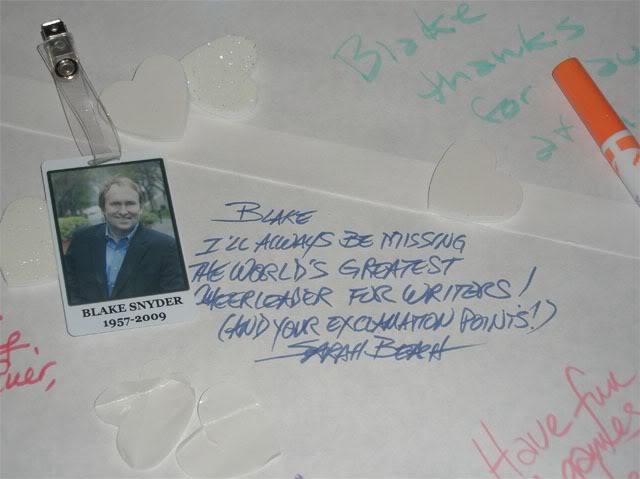 After everyone filed into the theater, the remembrancing began.
After everyone filed into the theater, the remembrancing began.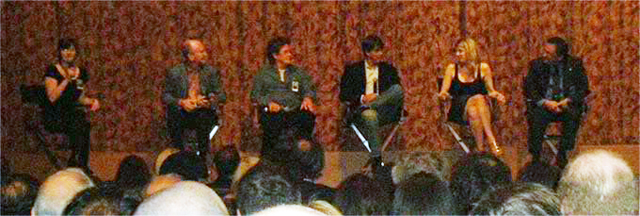




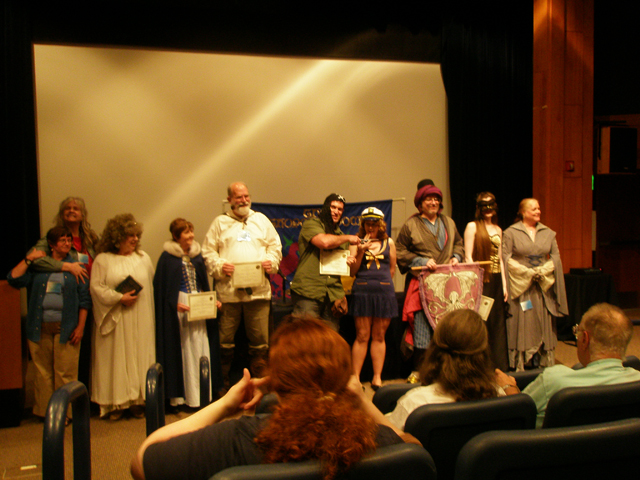
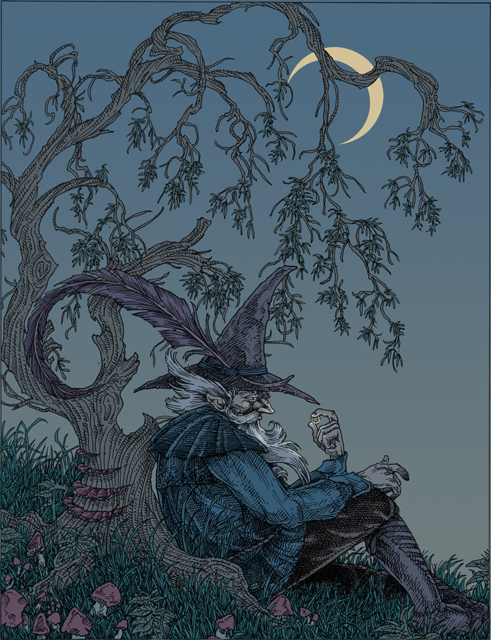
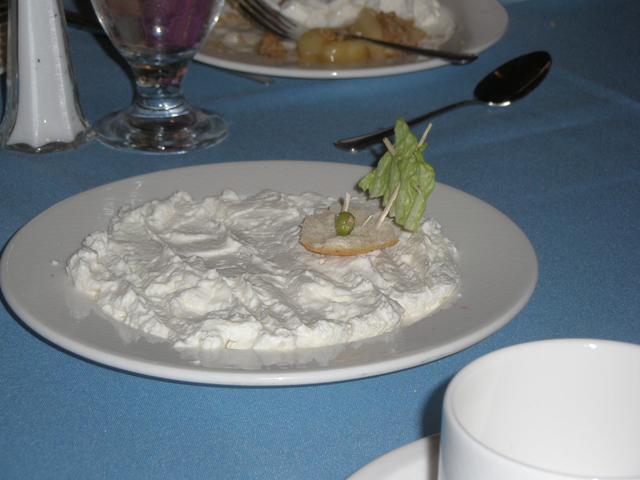



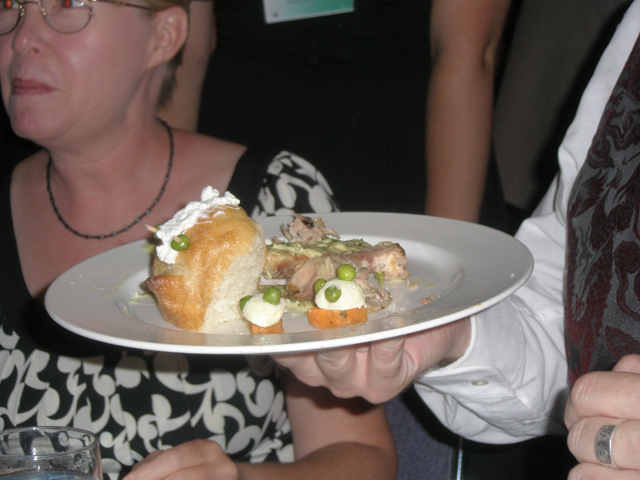


 Was converted to this —
Was converted to this —

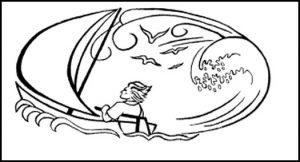
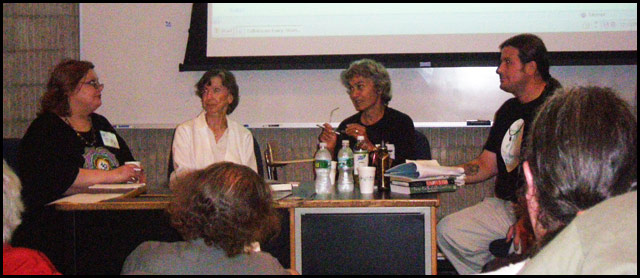
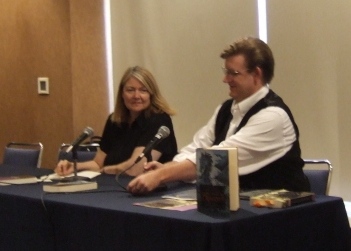

 The bit that really caught my attention was this last section:
The bit that really caught my attention was this last section: Even if you mention it and link to the book’s page a lot on the internet, it still is found mostly by those who are already looking for you or your subject matter. You don’t usually catch the attention of the casual passer-by. So, there is a point in wanting to get at least a few copies into book stores.
Even if you mention it and link to the book’s page a lot on the internet, it still is found mostly by those who are already looking for you or your subject matter. You don’t usually catch the attention of the casual passer-by. So, there is a point in wanting to get at least a few copies into book stores.
